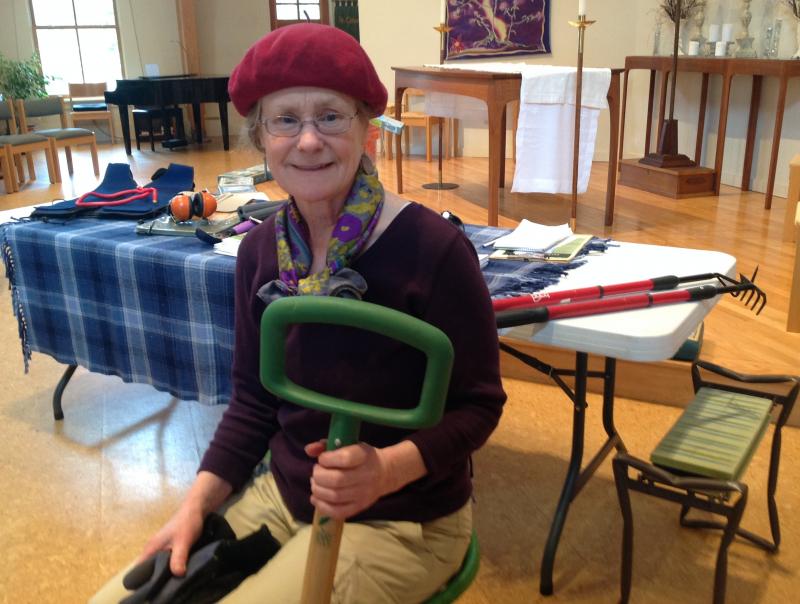Assistive technology, help for the avid gardener

The sighs of wellbeing were audible at the March 9 meeting of the Boothbay Region Garden Club as our presenter, Ellen Gibson, from Maine AgrAbility led the group through some simple stretching exercises, all doable from a sitting position. It was an introduction to the idea that there are safer and more comfortable ways to farm, or in our case, garden, even when the arthritic aches and pains from years of repetitive gardening movements come a calling.
The Maine AgrAbility Program of the University of Maine Cooperative Extension, in partnership with Goodwill Industries of Northern New England, and Alpha One (a center for independent living) with USDA grant funding, is an outreach program offered to farmers and farm workers with disabilities or chronic illnesses to help them keep farming. The project extends its reach to include fisherman and forest workers to ensure that their work can continue safely and productively even as time and injury take their toll on the body.
As a member of the Maine AgrAbility staff, Ellen Gibson provides information and technical assistance to farmers and gardeners who suffer injuries, pain or disabilities. She makes use of her background and training in rural community planning and holistic management practices to improve environmental health and economic viability. Gibson applies these principles even to her own work on her family farm where she raises Nubian goats and pastured chickens.
For the Garden Club presentation, Gibson focused on the two major problems encountered by people who do extensive gardening; lower back problems brought on and exacerbated by bending and stooping and the eventual arthritis that can set in after years of repetitive motion in the garden. She talked about gentle exercise and moving slowly when you wake being good ways to oil the joints and she pointed out the difference between physical activity and exercise.
A good exercise program will include aspects of flexibility, strength, endurance, balance and range of motion. While gardening is physical activity, it isn't necessarily addressing these features and can result in pain and injury. Gibson reminded the audience that to work safely a gardener needs to be mindful of how the body is feeling and respond to its needs to rest, hydrate, seek shade or perhaps change motion.
She emphasized that to continue being productive one needs to consider the principles of Work Simplification and Energy Conservation. She suggested that rather than spending a full day in the garden doing one repetitive task to get a job done all at once, break the routine into 45-minute intervals where you might switch to a task periodically that uses different muscles. Stop now and again while in the garden to breathe and do some stretching exercises that will help center and relax the body while in the midst of garden chores.
To conserve energy, consider turning some work over to someone else who may be more suited to the task or use more ergonomically designed tools. Gibson shared an array of such tools that in AgrAbility jargon are called "assistive technology." From something as simple as a small hand tool with a curved handle and larger grip for carpel tunnel sufferers to a low swivel chair on wheels that enables work from a sitting position, her tools of the trade make it clear that AgrAbility is fully invested in finding ways to assist those who want to continue to farm or garden in spite of some diminished capacity.
Gibson concluded by talking about the movement toward Universal Design which means designs that can accommodate the widest range of abilities. This can include toddler to the elderly, able bodied to the disabled and even language differences that affect signage in public places. A simple example would be a door that can be opened by leaning on a bar or using a lever instead of a knob limiting the need for strength or dexterity.
The talk was of benefit to all present and was a wonderful prologue to the next main event - spring!
If you or someone you know needs farming assistance or would like more information on this program and field of study, go to umaine.edu/agrability or www.alphaonenow.com/maine_agrability.htm. The services offered by Maine AgrAbility are free.




























